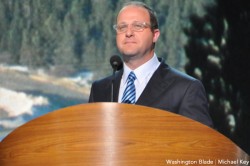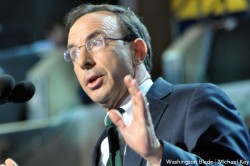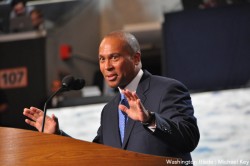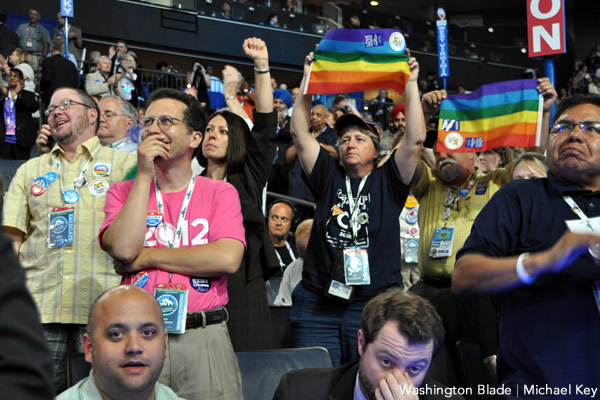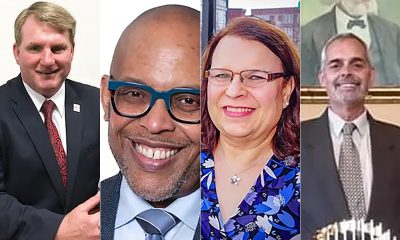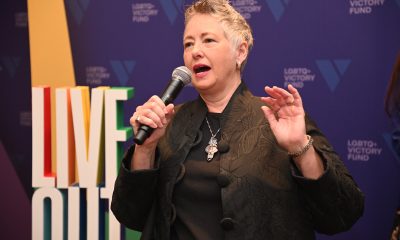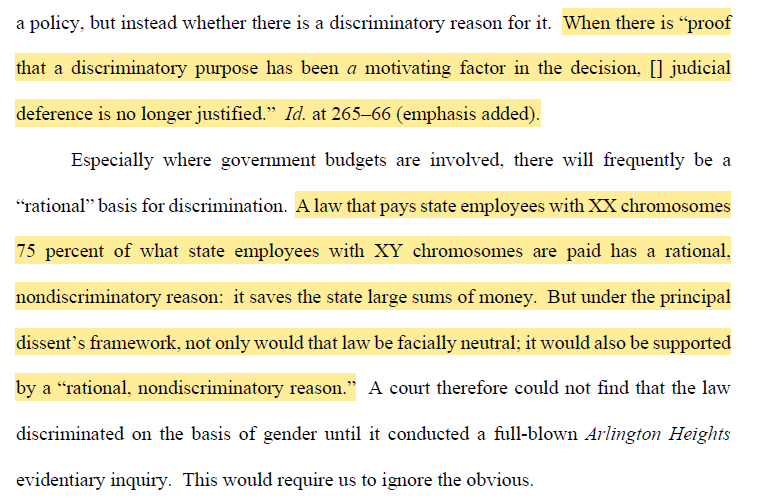National
DNC 2012: Gay speakers, issues pervade convention
Delegates approve platform backing marriage equality
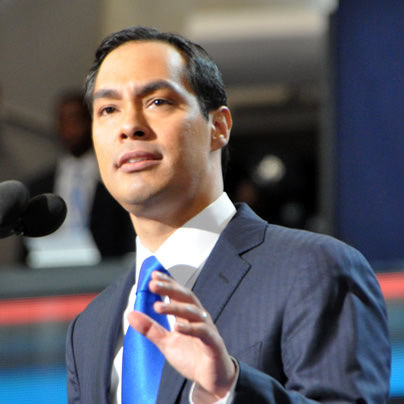
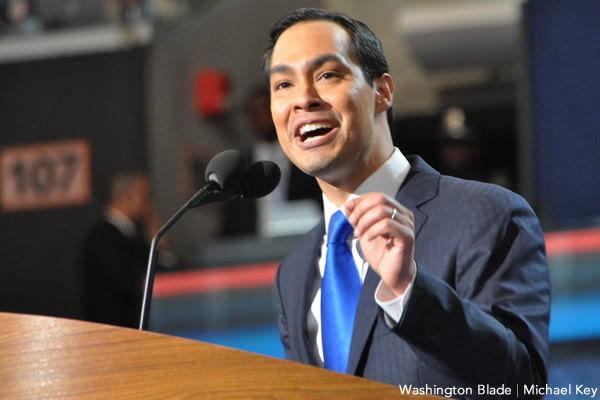
San Antonio Mayor Julian Castro dinged Mitt Romney at the Democratic National Convention for his opposition to marriage equality (Blade photo by Michael Key)
CHARLOTTE, N.C. — The first official day of the Democratic National Convention showcased the party’s solidarity with the LGBT community as speakers — including several openly gay Democrats — took to the podium to voice support and delegates approved for the first time a platform that endorses marriage equality.
Capping off the evening were high-profile speeches from San Antonio Mayor Julian Castro, who’s considered a rising star in the Democratic Party and possibly a contender for the next governor of Texas, and first lady Michelle Obama. Both mentioned LGBT rights in their speeches to attendees at the Time Warner Cable Arena.
Castro made a reference to marriage equality when reciting a list of issues supported by Democrats, but opposed by Republican presidential nominee Mitt Romney. The GOP candidate is against same-sex marriage and has endorsed a Federal Marriage Amendment.
“When it comes to getting the middle class back to work, Mitt Romney says, ‘No,'” Castro said. “When it comes to respecting women’s rights, Mitt Romney says, ‘No.’ When it comes to letting people marry whomever they love, Mitt Romney says, ‘No.'”
Castro continued that Romney also says “no” to expanding access to health care for all Americans, but noted Romney originally said “yes” to that — an allusion to the health care reform Romney helped pass into law as the Massachusetts governor. Castro added, “Gov. Romney has undergone an extreme makeover, and it ain’t pretty.”
The San Antonio mayor’s speech was a hit among attendees at the convention, who held up signs reading “Opportunity” and “Oportunidad” as he spoke.
Michelle Obama delivered a speech that was more personal, emphasizing her husband’s commitment to his family despite her concerns upon taking office about the sacrifices about what being president meant for their two daughters.
“But today, I have none of those worries from four years ago about whether Barack and I were doing what’s best for our girls,” Michelle Obama said. “Because today, I know from experience that if I truly want to leave a better world for my daughters, and all our sons and daughters … then we must work like never before, and we must once again come together and stand together for the man we can trust to keep moving this great country forward, my husband, our president, President Barack Obama.”
Michelle Obama also hit on her husband’s support for LGBT rights during her remarks when she spoke of his commitment to the people of diverse backgrounds, saying “Barack knows the American Dream because he’s lived it — and he wants everyone in this country to have that same opportunity, no matter who we are, or where we’re from, or what we look like, or who we love.”
The first lady’s speech was widely seen as successful. Attendees at the convention held up slim, vertical signs reading, “We love Michelle Obama” and cheered as she spoke.
Jerame Davis, executive director of the National Stonewall Democrats, noted Michelle Obama’s speech when talking about how Tuesday night at the Democratic convention strongly contrasted with “last week’s Republican hate-fest” in Tampa.
“First Lady Michelle Obama was inspirational and gave us a glimpse of the love she has for her family,” Davis said. “She is the heart and soul of the first family and that was on full display tonight.”
In a historic development, the 5,963 delegates to the convention approved a Democratic platform that for the first time includes a plank supporting marriage equality. Language in the platform also rejects the Defense of Marriage Act and affirms support for the Employment Non-Discrimination Act.
New Jersey Mayor Cory Booker, a co-chair of the platform committee, said prior to the final approval the manifesto embodies the principles of the Democratic Party, including the notion that individuals should be able to pursue the American dream regardless of, among other factors, whom they love.
“This platform of big and practical ideas sets forth an emboldened pathway toward the historic hope which has driven generations of Americans forward,” Booker said. “It is our most fundamental national aspiration—that no matter who you are, no matter what your color, creed, how you choose to pray or who you choose to love, that if you are an American — first generation or fifth — one who is willing to work hard, play by the rules and apply your God-given talents—that you should be able to find a job that pays the bills.”
Delegates approved the platform by a loud voice vote when Democratic National Committee Chair and Los Angeles Mayor Antonio Villaraigosa asked for “yays” and “nays” to accept the manifesto. No one was heard voicing objection to the platform when Villaraigosa asked for the “nays.”
In addition to the high-profile speeches at the end of the evening, at least four openly gay speakers were among those delivering remarks from the podium. Democratic National Committee Treasurer Andrew Tobias, Democratic National Convention Committee CEO Stephen Kerrigan and Service Employees International Union Mary Kay Henry and U.S. Rep. Jared Polis (D-Colo.) delivered remarks.
A primetime speaking slot was awarded to Polis, who is slated to become the most senior openly gay member in the lower chamber of Congress upon the start of next year after Reps. Barney Frank (D-Mass.) and Tammy Baldwin (D-Wis.) finish their final terms as U.S. House members.
Polis wasn’t shy about talking about his sexual orientation during his speech. He declared he was gay among other things upon taking the stage, saying, “My name is Jared Polis. My great-grandparents were immigrants. I am Jewish. I am gay. I am a father. I am a son. I am an entrepreneur. I am a congressman from Colorado. I am always an optimist. But first and foremost, I am an American.”
The first openly gay parent to serve in Congress, Polis mentioned his partner, Marlon Reis, by name while emphasizing respect for diversity — for people who may identify as LGBT and others who hold views that are either conservative or progressive.
“So tonight, I don’t just ask my fellow Americans to respect my relationship with my partner Marlon and my role as a father to our son,” Polis said. “I also ask them to respect the Christian family concerned about decaying moral values and crass commercialism. I ask them to respect the difficult decision of a single mother to bring a child into this world, because of her heartfelt beliefs.”
Polis mentioned some of Obama’s pro-LGBT initiatives that he said demonstrates the president’s understanding that progress can only be achieved by working together.
“It is why he repealed ‘Don’t Ask, Don’t Tell,’ so that no person is prevented from serving the country they love because of whom they love,” Polis said. “And it is why Barack Obama became the first sitting president in American history to show his personal support for same-sex marriage.”
Tobias, who spoke earlier in the day, said his speech marked the fourth time he’s addressed a Democratic National Convention and noted each time he’s made an address he talks about two things: money and equality.
Praising Obama for his work over his first term, Tobias said the administration has “dramatically improved” the lives of millions of LGBT Americans and “at no cost” to anyone else.
Tobias also offered a personal anecdote about being gay as a way to demonstrate the tremendous progress that has been made on LGBT rights in the past few decades.
“In college, I thought I was the only guy in the world who liked other guys,” Tobias said. “Later I found there was someone else like me, our 26-year-old resident tutor. He and I never talked about it at the time. No one talked about being gay back then. People killed themselves over being gay. Tragically, some kids still do.”
Tobias later revealed the identity of that resident tutor, saying he wed another man at a wedding just eight weeks ago, where love that was “unspeakable” nearly a half-century ago was celebrated “by hundreds of people — straight and gay, surfers and senators.”
“In a way, it was a wedding that married my two topics — money and equality — because that young tutor had grown up to become the chairman of the House Financial Services Committee: Barney Frank,” Tobias said.
Kerrigan, who was charged with managing the convention, made no explicit mention of his sexual orientation or LGBT issues during his speech and instead talked about the opportunities at the convention and access through digital media. Neither did SEIU’s Henry, who focused on labor issues while criticizing Romney, saying “Time after time, working families have paid the price for Mitt Romney’s success.”
Many other speakers throughout the evening also hit on LGBT rights as they praised President Obama. They include U.S. Senate candidate Tim Kaine, who said Obama kept his commitment to “fair treatment for LGBT Americans.” Recognition of Obama’s push to end “Don’t Ask, Don’t Tell” came in addition to Polis from Massachusetts Gov. Deval Patrick; platform committee co-chair and first woman to reach the rank of three-star general in the Army, retired Lt. Gen. Claudia Kennedy; U.S. House candidate Tammy Duckworth; Chicago Mayor Rahm Emanuel; Maya Soetoro-Ng, Obama’s sister; and actor and former White House official Kal Penn.
Richard Socarides, a gay delegate from New York City and former adviser to President Clinton on LGBT rights, said the developments at the convention added up to “a historic night” for the LGBT community and “a great night for our party.”
“Our platform plank was adopted plus every speaker seemed so proud to be the party of all America, including us,” Socarides said. “I thought — we are part of this party’s vision of America.”
The pro-LGBT developments came in stark contrast to last week’s Republican National Convention, when no openly speaker was at the podium and speakers advocated for traditional marriage. Delegates in Tampa also approved a platform limiting marriage to one man, one woman and endorsing a Federal Marriage Amendment.
Jimmy LaSalvia, executive director of the gay conservative group GOProud, nonetheless was dismissive of what happened on the first night of the Democratic convention.
“Nothing that they could put in the platform would do anything to cover up President Obama’s disastrous record on jobs and the economy,” LaSalvaia said. “All the openly gay speakers and wonderful feel-good platform language won’t change the fact that, just like everyone else in America, gay people aren’t any better off than they were four years ago.”
National
United Methodist Church removes 40-year ban on gay clergy
Delegates also voted for other LGBTQ-inclusive measures
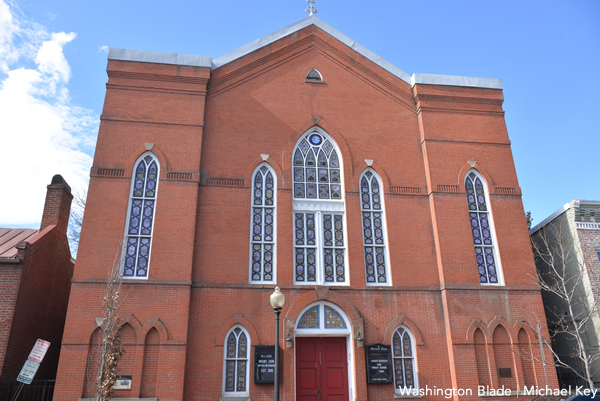
The United Methodist Church on Wednesday removed a ban on gay clergy that was in place for more than 40 years, voting to also allow LGBTQ weddings and end prohibitions on the use of United Methodist funds to “promote acceptance of homosexuality.”
Overturning the policy forbidding the church from ordaining “self-avowed practicing homosexuals” effectively formalized a practice that had caused an estimated quarter of U.S. congregations to leave the church.
The New York Times notes additional votes “affirming L.G.B.T.Q. inclusion in the church are expected before the meeting adjourns on Friday.” Wednesday’s measures were passed overwhelmingly and without debate. Delegates met in Charlotte, N.C.
According to the church’s General Council on Finance and Administration, there were 5,424,175 members in the U.S. in 2022 with an estimated global membership approaching 10 million.
The Times notes that other matters of business last week included a “regionalization” plan, which gave autonomy to different regions such that they can establish their own rules on matters including issues of sexuality — about which international factions are likelier to have more conservative views.
Federal Government
Republican state AGs challenge Biden administration’s revised Title IX policies
New rules protect LGBTQ students from discrimination

Four Republicans state attorneys general have sued the Biden-Harris administration over the U.S. Department of Education’s new Title IX policies that were finalized April 19 and carry anti-discrimination protections for LGBTQ students in public schools.
The lawsuit filed on Tuesday, which is led by the attorneys general of Kentucky and Tennessee, follows a pair of legal challenges from nine Republican states on Monday — all contesting the administration’s interpretation that sex-based discrimination under the statute also covers that which is based on the victim’s sexual orientation or gender identity.
The administration also rolled back Trump-era rules governing how schools must respond to allegations of sexual harassment and sexual assault, which were widely perceived as biased in favor of the interests of those who are accused.
“The U.S. Department of Education has no authority to let boys into girls’ locker rooms,” Tennessee Attorney General Jonathan Skrmetti said in a statement. “In the decades since its adoption, Title IX has been universally understood to protect the privacy and safety of women in private spaces like locker rooms and bathrooms.”
“Florida is suing the Biden administration over its unlawful Title IX changes,” Florida Gov. Ron DeSantis wrote on social media. “Biden is abusing his constitutional authority to push an ideological agenda that harms women and girls and conflicts with the truth.”
After announcing the finalization of the department’s new rules, Education Secretary Miguel Cardona told reporters, “These regulations make it crystal clear that everyone can access schools that are safe, welcoming and that respect their rights.”
The new rule does not provide guidance on whether schools must allow transgender students to play on sports teams corresponding with their gender identity to comply with Title IX, a question that is addressed in a separate rule proposed by the agency in April.
LGBTQ and civil rights advocacy groups praised the changes. Lambda Legal issued a statement arguing the new rule “protects LGBTQ+ students from discrimination and other abuse,” adding that it “appropriately underscores that Title IX’s civil rights protections clearly cover LGBTQ+ students, as well as survivors and pregnant and parenting students across race and gender identity.”
Federal Government
4th Circuit rules gender identity is a protected characteristic
Ruling a response to N.C., W.Va. legal challenges
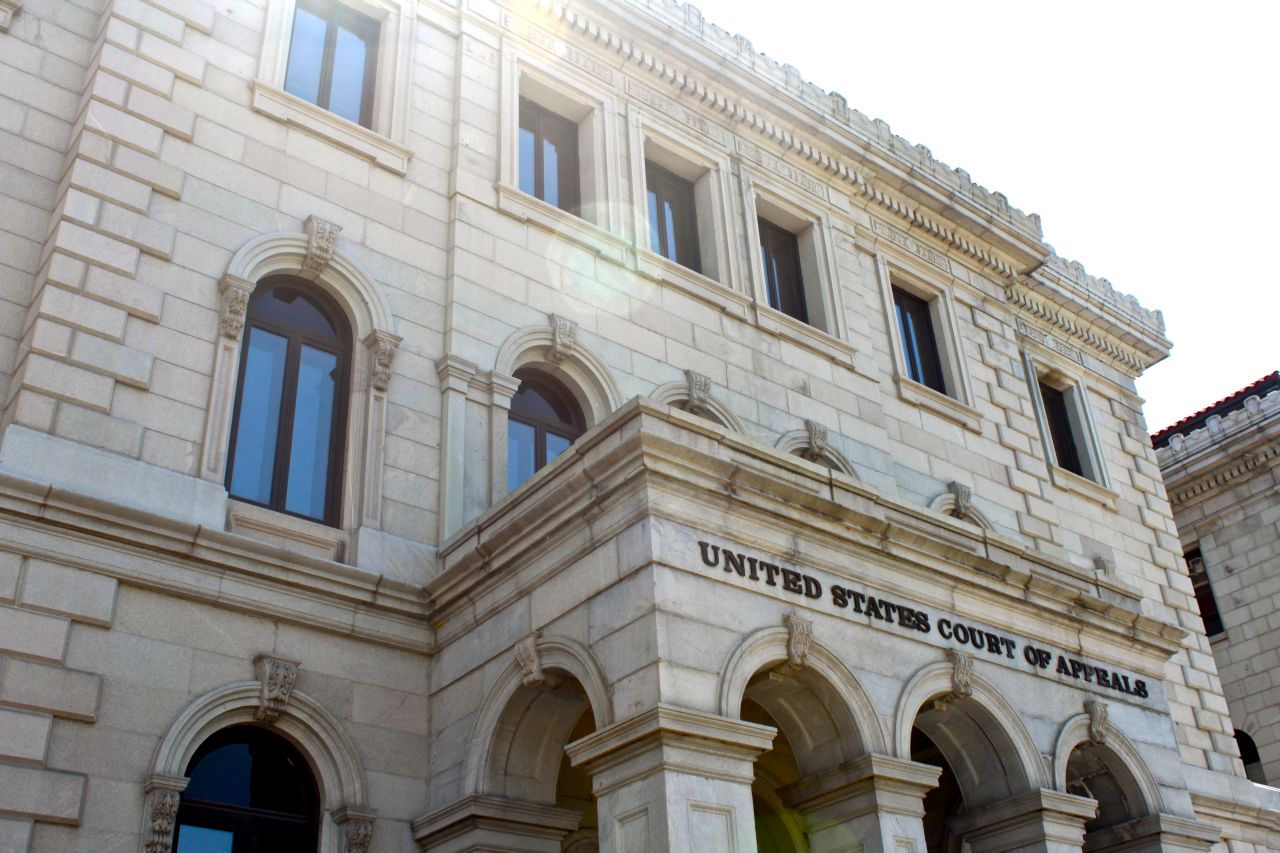
BY ERIN REED | The 4th U.S. Circuit Court of Appeals ruled Monday that transgender people are a protected class and that Medicaid bans on trans care are unconstitutional.
Furthermore, the court ruled that discriminating based on a diagnosis of gender dysphoria is discrimination based on gender identity and sex. The ruling is in response to lower court challenges against state laws and policies in North Carolina and West Virginia that prevent trans people on state plans or Medicaid from obtaining coverage for gender-affirming care; those lower courts found such exclusions unconstitutional.
In issuing the final ruling, the 4th Circuit declared that trans exclusions were “obviously discriminatory” and were “in violation of the equal protection clause” of the Constitution, upholding lower court rulings that barred the discriminatory exclusions.
The 4th Circuit ruling focused on two cases in states within its jurisdiction: North Carolina and West Virginia. In North Carolina, trans state employees who rely on the State Health Plan were unable to use it to obtain gender-affirming care for gender dysphoria diagnoses.
In West Virginia, a similar exclusion applied to those on the state’s Medicaid plan for surgeries related to a diagnosis of gender dysphoria. Both exclusions were overturned by lower courts, and both states appealed to the 4th Circuit.
Attorneys for the states had argued that the policies were not discriminatory because the exclusions for gender affirming care “apply to everyone, not just transgender people.” The majority of the court, however, struck down such a claim, pointing to several other cases where such arguments break down, such as same-sex marriage bans “applying to straight, gay, lesbian, and bisexual people equally,” even though straight people would be entirely unaffected by such bans.
Other cases cited included literacy tests, a tax on wearing kippot for Jewish people, and interracial marriage in Loving v. Virginia.
See this portion of the court analysis here:
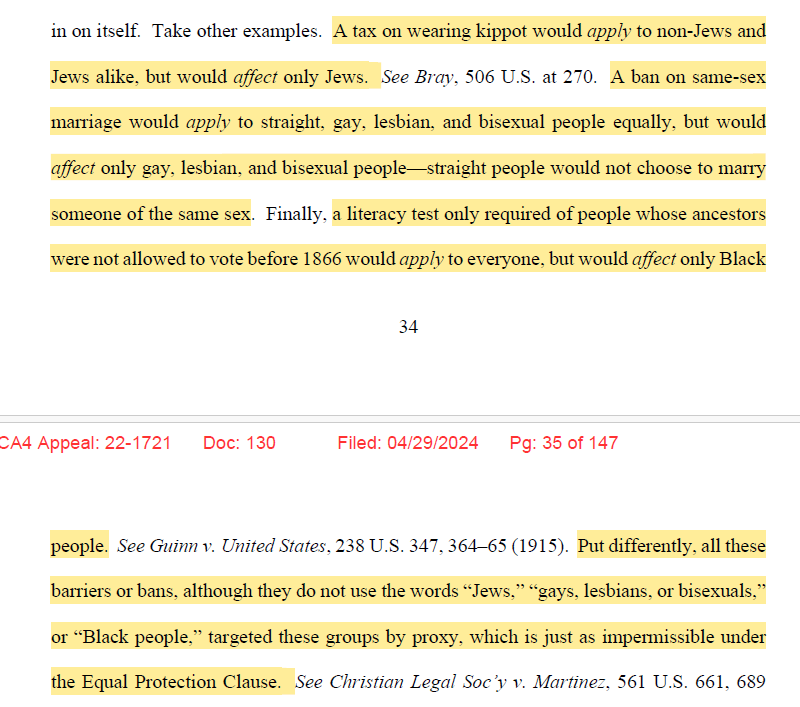
Of particular note in the majority opinion was a section on Geduldig v. Aiello that seemed laser-targeted toward an eventual U.S. Supreme Court decision on discriminatory policies targeting trans people. Geduldig v. Aiello, a 1974 ruling, determined that pregnancy discrimination is not inherently sex discrimination because it does not “classify on sex,” but rather, on pregnancy status.
Using similar arguments, the states claimed that gender affirming care exclusions did not classify or discriminate based on trans status or sex, but rather, on a diagnosis of gender dysphoria and treatments to alleviate that dysphoria.
The majority was unconvinced, ruling, “gender dysphoria is so intimately related to transgender status as to be virtually indistinguishable from it. The excluded treatments aim at addressing incongruity between sex assigned at birth and gender identity, the very heart of transgender status.” In doing so, the majority cited several cases, many from after Geduldig was decided.
Notably, Geduldig was cited in both the 6th and 11th Circuit decisions upholding gender affirming care bans in a handful of states.
The court also pointed to the potentially ridiculous conclusions that strict readings of what counts as proxy discrimination could lead to, such as if legislators attempted to use “XX chromosomes” and “XY chromosomes” to get around sex discrimination policies:
Importantly, the court also rebutted recent arguments that Bostock applies only to “limited Title VII claims involving employers who fired” LGBTQ employees, and not to Title IX, which the Affordable Care Act’s anti-discrimination mandate references. The majority stated that this is not the case, and that there is “nothing in Bostock to suggest the holding was that narrow.”
Ultimately, the court ruled that the exclusions on trans care violate the Equal Protection Clause of the Constitution. The court also ruled that the West Virginia Medicaid Program violates the Medicaid Act and the anti-discrimination provisions of the Affordable Care Act.
Additionally, the court upheld the dismissal of anti-trans expert testimony for lacking relevant expertise. West Virginia and North Carolina must end trans care exclusions in line with earlier district court decisions.
The decision will likely have nationwide impacts on court cases in other districts. The case had become a major battleground for trans rights, with dozens of states filing amicus briefs in favor or against the protection of the equal process rights of trans people. Twenty-one Republican states filed an amicus brief in favor of denying trans people anti-discrimination protections in healthcare, and 17 Democratic states joined an amicus brief in support of the healthcare rights of trans individuals.
Many Republican states are defending anti-trans laws that discriminate against trans people by banning or limiting gender-affirming care. These laws could come under threat if the legal rationale used in this decision is adopted by other circuits. In the 4th Circuit’s jurisdiction, West Virginia and North Carolina already have gender-affirming care bans for trans youth in place, and South Carolina may consider a similar bill this week.
The decision could potentially be used as precedent to challenge all of those laws in the near future and to deter South Carolina’s bill from passing into law.
The decision is the latest in a web of legal battles concerning trans people. Earlier this month, the 4th Circuit also reversed a sports ban in West Virginia, ruling that Title IX protects trans student athletes. However, the Supreme Court recently narrowed a victory for trans healthcare from the 9th U.S. Circuit Court of Appeals and allowed Idaho to continue enforcing its ban on gender-affirming care for everyone except the two plaintiffs in the case.
Importantly, that decision was not about the constitutionality of gender-affirming care, but the limits of temporary injunctions in the early stages of a constitutional challenge to discriminatory state laws. It is likely that the Supreme Court will ultimately hear cases on this topic in the near future.
Celebrating the victory, Lambda Legal Counsel and Health Care Strategist Omar Gonzalez-Pagan said in a posted statement, “The court’s decision sends a clear message that gender-affirming care is critical medical care for transgender people and that denying it is harmful and unlawful … We hope this decision makes it clear to policy makers across the country that health care decisions belong to patients, their families, and their doctors, not to politicians.”
****************************************************************************

Erin Reed is a transgender woman (she/her pronouns) and researcher who tracks anti-LGBTQ+ legislation around the world and helps people become better advocates for their queer family, friends, colleagues, and community. Reed also is a social media consultant and public speaker.
******************************************************************************************
The preceding article was first published at Erin In The Morning and is republished with permission.


